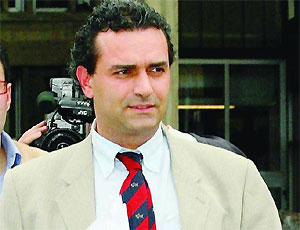Anti-Mafia prosecutor takes his fight to European stage
 Brussels - Luigi de Magistris is not a name likely to ring many bells outside of Italy. But it could soon.
Brussels - Luigi de Magistris is not a name likely to ring many bells outside of Italy. But it could soon.
De Magistris made Italian headlines in recent years by investigating illustrious politicians on both the left and right.
But if this purposeful prosecutor from Naples has his way, his ambition to fight the Mafia in every corner of Europe could soon make him a familiar figure in Amsterdam, London and Berlin.
"One of the biggest mistakes is to consider the Mafia an Italian problem. It isn't. I want to make people understand that it is a European problem," de Magistris said in an exclusive interview with the German Press Agency dpa.
De Magistris, who comes from a family of magistrates, spent 15 years battling the Camorra and 'Ndrangheta organized crime networks in their respective dens of Campania and Calabria in Italy.
But when, in 2005 and 2006, he decided to investigate what he calls "the relationship between the Mafia, businessmen and politicians", and their role in the alleged embezzlement of hundreds of millions of euros in European Union funds, the Italian establishment turned against him.
The decision by then Justice Minister Clemente Mastella to take him off the case sparked an uproar in Italy, but it also turned him into a star virtually overnight.
"I had been lucky enough to get a dream job. But they made it impossible for me to go on," he said in explaining his decision to switch to politics.
De Magistris was eventually asked to run for the European Parliament by his close friend, Antonio di Pietro, a magistrate-cum- politician best known for his leading role in bringing down the corrupt rule of Christian Democrats and Socialists in Italy's Tangentopoli
(Bribesville) scandal of the early 1990s.
But even Di Pietro, whose Italy of Values party has joined the liberal-democrats in Brussels and Strasbourg, could not have anticipated such an overwhelming response from voters.
In the June elections, de Magistris become the member who received the most votes out of the entire European Parliament (EP), with nearly half a million Italians crossing his name in the ballot box. He took his seat in July.
De Magistris now wants to use his vast experience as a front line anti-Mafia and anti-graft prosecutor to crack down on the abuse of EU funds.
As head of the influential parliamentary Committee on Budgetary Control, the Italian will have a prominent role in making sure that European taxpayers' money is spent wisely and honestly.
This means not being afraid to take on the continent's powerful organized crime networks.
"We are talking about enormous sums - hundreds of billions of euros. This is where the interests of mobsters and corrupt politicians often meet. And one of my priorities is to break this link," he said.
For those who still think the Mafia is just an Italian problem, de Magistris points to the 2007 Duisburg massacre, in which a bloody feud between two rival 'Ndrangheta clans led to six mobsters being gunned down in a pizzeria in the German city.
Equally worrying is the fact that organized crime networks, whether Italian, Eastern European or Colombian, launder the proceeds of their drug trafficking by buying up properties in Spain and much of northern Europe.
In 2004, for instance, it emerged that Calabrian mobsters had bought an entire neighbourhood in Brussels, not far from the headquarters of the EU.
De Magistris will no longer have a police team at his disposal, but his committee will work closely with the European Court of Auditors, the EU's Anti-Fraud Office, OLAF, and Europol, a law enforcement organisation which assists the police of member states in their fight against serious forms of organised crime.
He believes the committee should give precedence to projects that create jobs and which are environmentally friendly. But his office should also keep a close watch on the millions of euros of humanitarian aid that the EU donates each year to Afghanistan, Iraq, Africa and Asia.
In order to succeed, however, Brussels veterans warned that he will need to forge strong alliances, both within the parliament and with other EU institutions.
"The importance of our committee is often underrated," he said, pointing to its key role in bringing down, in 1999, the European Commission headed by Jacques Santer amid accusations of corruption and nepotism.
"I hope that we will not only uncover fraud, but also prevent it. And I want people to know that this committee will not be run in a bureaucratic way," he warned.
De Magistris said he was determined to ensure the next commission takes the fight against corruption seriously, and promised to unveil headline-grabbing initiatives some time "soon." (dpa)